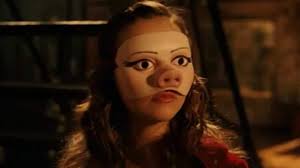Eye For Film >> Movies >> Penelope (2006) Film Review

It's a good time to be a fan of film and fairy tales. Magic at the movies has a long tradition, from lightweight confections to Enchanted to darker, more mature fare like Pan's Labyrinth. As a modern fairy tale Penelope has a gentle touch, and while flat in places it's definitely more silk purse than sow's ear.
Perhaps unsurprisingly for a film with an eponymous heroine, Penelope takes after Cinderella. Thus, there is a curse, and, as is tradition, an expectation of a Prince Charming to rescue her.

As Penelope, Christina Ricci is also a Wilhern, daughter of an aristocratic family from some indeterminate no-place: a vague artistic conjunction of the expensive bits near Hackney and Harlem; NY:LON as region rather than route. This is, after all, a modern fairy tale, and parks, the papparazi, couriers on Vespas and Irish theme pubs all play a part.
For a betrayal of love in favour of class the Wilherns are cursed - the first daughter born to them will have the face of a pig, until she is "loved by one of her own". On hope of this day, she is hidden from the world by her zealous mother, former Home Alone matriarch Kate McCallister, with the grudging participation of her long-suffering father, Richard E Grant.
Here it's important to note that Penelope has a ridiculous cast. It's not stunt casting, but it verges on the wilfully capricious. It might be an accident of its trans-Atlantic production, but there's something fantastic about the presence of Reese Witherspoon (who was, admittedly, a producer) and Lenny Henry in minor roles. Especially when Lenny Henry is playing a character called Krull.
Ma Wilhern carefully introduces selected 'blue-bloods' to her daughter, in hope of lifting her curse. It's a difficult process, and there's plentiful stuntwork here - it's unlikely any other film released this year will have as many people jumping through windows. One of those retreating suitors is Simon Woods, whose escape from 'the pig-faced monster' attracts the attention of a cyclopean dwarf photographer named Lemon. Peter Dinklage (who was frankly brilliant in The Station Agent) lends genuine weight to this short statured snapper, who shortly enlists James MacAvoy in a scheme to get a picture of this mysterious girl. MacAvoy is genuinely affecting here, and manages to convince alongside (and ably support the performances of) talents as diverse as those of Ricci and Russel Brand.
To say more risks giving away the plot, which isn't as obvious as might be feared, with some well placed wit and tactful misdirection from debut filmwriter Leslie Caveny. An Emmy winner, her script has an ensemble sensibility that works well with this patchwork cast, though it does contribute somewhat to the televisual feel, with the occasional air of after-school special. There's a coda that at first feels a little forced, but any film brave enough to offer competing moral interpretations and then throw another life lesson dependent on the movements of a well-proportioned rowing boat has something going for it.
The only real problem with Penelope is Mark Palansky's direction. It's Palansky's debut feature, after pulling second unit duty on The Island and the totally unnecessary remake of The Amityville Horror, and a short series of interviews with a variety of screenwriters. His eye is alright, there's nothing glaringly wrong, but there's something off, something flat, about much of the film. Perhaps it's that we've been spoiled by the ghostly realism of Guillermo Del Toro, the whimsical knife-edge of Burton, the unhinged accuracy of Gilliam, even the hypnotising uniformity of Disney animation, but Penelope doesn't compete. It certainly seems to try in places: the makeup effects are brilliant; the performances great, full of what one could call accuratising foibles if the phrase "character notes" wasn't less cumbersome. The set dressing of Penelope's hidden bedroom and attached interview chamber is nigh perfect, with its wallpaper echoed subtly in the end credits. Sadly, they are only presented - there isn't any sense of visual magic, and that is a sad thing. If a fairy tale is to be shot with a documentary eye, it ought to be built with that in mind, and Penelope hasn't been.
That said, that is Penelope's only real problem, and to be brutally honest many people may notice it but it's uncertain that they would care. It might not do anything totally new, but this is a charming film, full of nice touches - far from a pig in a poke.
Reviewed on: 25 Jan 2008





















